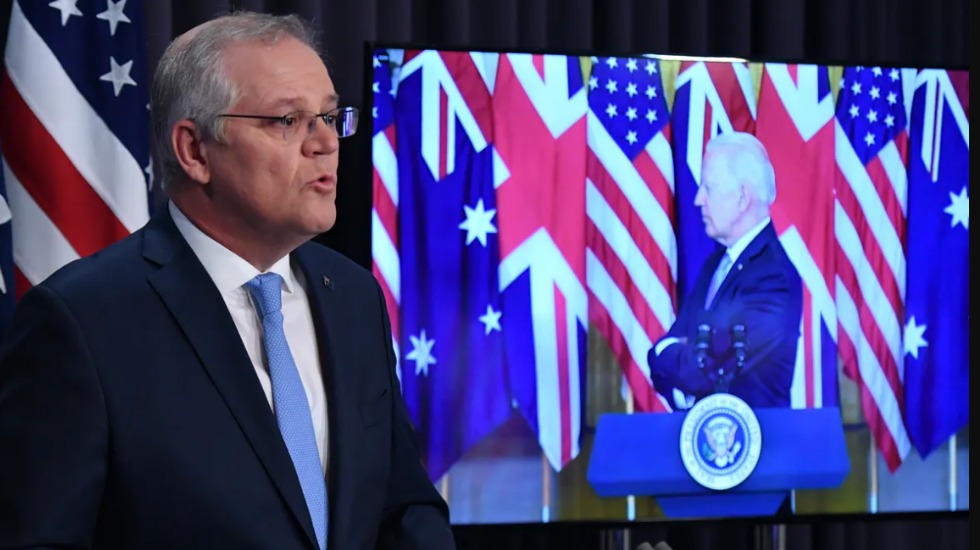Prime Minister Scott Morrison at the announcement of the AUKUS pact, with US President Joe Biden (right) looking on via link-up. Image: AAP
In the national conversation about the recently-announced trilateral security pact between Australia, the United States and the United Kingdom (AUKUS), the lone voice of dissent with any real stature is former Labor Prime Minister Paul Keating.
While a great many people of less prominence are railing against the Australian government’s decision to acquire nuclear-powered submarines, when it comes to the power to influence, Keating stands almost alone.
The party Keating once led has certainly expressed some concerns about the pact, but those concerns are focused entirely on the detail and the execution, not on the substance. And for the most part, the Australian ‘blob’ – the foreign policy establishment made up of think tanks, government, lobbyists, and a select group of academics, to import an entirely appropriate American term – has lined up behind the pact and its nuclear-powered submarines with barely-disguised glee.
Keating has been dismissed by those same occupants of the blob, as he himself wrote, as an out-of-touch ‘relic’. Often, those with an interest in sidelining Keating and his concerns will point to the former PM’s post-parliamentary role with the China Development Bank, implying that this disqualifies him entirely from the discussion.
This smug dismissal, and the refusal to engage in the very real strategic and moral questions Keating raises, reveals a great deal about the nature and interests of political power and influence in this country.
It’s significant that Keating’s heirs in the Labor Party have distanced themselves from his blistering analysis. In the risk-averse political landscape of Canberra, the bipartisan consensus over Australia’s relationship with the United States is now so ingrained that even a hero of the party can’t crack it open.
When it comes to the blob as a whole, though, the dismissal reveals a great deal more. It shows how a connection to any country other than the United States or the United Kingdom is read as a form of betrayal and malicious intent (somehow, the US and UK are never quite as foreign as others). The concept of a ‘Manchurian candidate’ may have fallen from popular parlance, but the coding of insidious foreign influences acting in bad faith to manipulate Australia’s interests is the same.
Coming from the Australian blob, this is deeply hypocritical. The influential think tanks that have loudly and consistently encouraged the deepening of Australia’s security enmeshment with the United States that Keating rails against have their own international connections and interests.
Some of them are directly funded by the government whose ‘shared values’ with the United States they – coincidentally – so wholeheartedly support. And some of them – the most powerful and influential – receive funding directly from the United States Departments of Defence and State.
Is that disqualifying? Not necessarily. The blob is transparent about its sources of support and unapologetic about its access to power. But it’s interesting what standards are applied, and who they are applied to.
Those standards mean that rather than engaging in some self-reflection over that hypocrisy, or perhaps thinking more deeply about what this revived “Anglosphere” says about Australia and its history, the blob’s discussion of AUKUS deliberately and systematically dismisses and excludes dissenting voices.
PLEASE HELP US CONTINUE TO THRIVE BY BECOMING AN OFFICIAL FOOTYOLOGY PATRON. JUST CLICK THIS LINK.
Overwhelmingly, the language used by the blob to discuss the alliance and foreign and security policy more generally is purposefully inaccessible. It’s technical and full of academic jargon. It will use words and concepts like “interoperability” and “geoeconomics” and go into detailed assessments of the number and nature of Chinese military equipment and capabilities, dictating the terms of the discussion before it can even begin.
That language implies, always, that its users have access to information that regular people don’t have. It encourages, quite deliberately, the widespread assumption that we’re living out the opening chapters of John Marsden’s Tomorrow When the War Began.
And because the people who use that language are so close to power and are so influential, that can seem entirely possible.
I suspect they don’t have more information. And even if they do, it is being filtered through deeply ingrained interests and assumptions about the nature of the world – mostly, that war and conflict are inevitable and that there are fundamental, insurmountable differences between “us” and the rest.
The assumption underlying the widespread support of this new pact is that American (and British) power is inherently good and must be spread and maintained in the face of any threat, perceived or real, in order to protect this white-dominated country in its non-white region.
That’s what the term “Anglosphere”, with all of its white imperial nostalgia, really means. All of the technical language around it, the dismissal of Keating, the smug ‘insider-y’ nature of the conversation, serves to obscure is that simple motivation.
It refuses to even acknowledge the deeply racist history and present of this country and how that informs its military alliances and power projection. The message about exactly who the blob represents – and who it doesn’t – should be clear.
This framing means that the very simple moral and strategic questions Keating raises aren’t taken seriously. We don’t get to talk about the moral implications of Australia going nuclear without any consultation. We don’t get to talk about why our government feels that it must support the United States’ nuclear arsenal, or why it’s OK for the US to hold the threat of nuclear apocalypse over the rest of the world, without being dismissed as either naive or a relic or both.
It is not naive, or out of touch, to suggest that war with China is not, in fact, inevitable. It is not naive to point out that arms races don’t, automatically, prevent conflicts (in fact, often the opposite). It is critical that as a nation we have an honest conversation about the relatively simple moral and strategic questions this new security pact raises. Australians and the people we share this region with deserve a chance to imagine a different world, and a different role for this country in it.
Dr Emma Shortis is a Research Fellow in the Social and Global Studies Centre at RMIT University, and the author of Our Exceptional Friend: Australia’s Fatal Alliance with the United States.












Dear Emma Shortis,
thanks for your thoughtful analysis. You may be interested in reading the works of Michael Hudson vis-a-vis the US geopolitical game that’s been played for the last 50+ years. Perhaps acquiring a copy of his 3rd edition of Super Imperialism would assist
I’ve already ordered a copy of Super Imperialism (3rd edition) but listening to Michael Hudson expand upon his views with @moderate_rebels meshes a clearer understanding of why knowing the reality of money and banking (MMT) is such a threat to replacing the ongoing government debt and deficit views of orthodox economics pedaled around the world and as sold to all of us great unwashed.
It becomes even clearer why the orthodoxy and those in control (the USA) don’t want others to understand MMT because, if they did, the US dollarisation hegemony would be seen to be the fraud perpetrated on others that it is. https://www.youtube.com/watch?v=Uiz934HVZjY & transcript https://michael-hudson.com/2021/10/we-make-the-rules/. Melding the correct understanding of sovereign free floating currency and banking with how they are/can be employed to mobilise resources of a nation blows the doors off the US control and their game of financialisation of other nations. All done in order to control them, effectively as vassal states. Have to agree with Michael that “Australia is hopeless”.
“MICHAEL HUDSON: At any rate, Australia has never been known to do anything that America or London didn’t want.
Well, once Australia actually elected a socialist prime minister, and all of a sudden the British representatives said, no, you’re not allowed to elect anyone the queen of England doesn’t recognize; you have to cancel the election.
And they did. They didn’t say we want to be free of England. They said, oh, ok, who should we elect? And America told England to tell Australia who to elect.
So Australia is hopeless.”
I think the local Australian analysis of such as AUKUS that you have provided https://footyology.com.au/aukus-and-the-blob/ doesn’t yet get to what’s really going on but distracts from that by zeroing in on the false dichotomy between China and the West. Not even the explanation that the US will never supply Australia with nuclear subs is canvasses because their ploy is to have their own ones based here as a US military outstation in the western Pacific. Some glimmers of knowing what questions to ask show the possibility of leading to more understanding “We don’t get to talk about the moral implications of Australia going nuclear without any consultation. We don’t get to talk about why our government feels that it must support the United States’ nuclear arsenal, or why it’s OK for the US to hold the threat of nuclear apocalypse over the rest of the world, without being dismissed as either naive or a relic or both.” But I won’t hold my breath.
Use of military power to control foreign assets is now also done indirectly via IMF, World Bank dollarising foreigners’ debt. Also MMT starkly clarifies that the economy is not money but the real resources that can be mobilised in a national currency.
As energy is used in everything we do, via its function as a work/convenience multiplier, its cost feeds into everything. Giving the power of energy generation to the people via renewables removes the hegemonic control of the US (oil and other fossil fuels become stranded assets) over all former users of those US controlled resources. Will we be smart enough to avoid privatisation of the sun’s free energy resources of the sun? Not on present thinking in this country.
Thanks again.
Fred Schilling